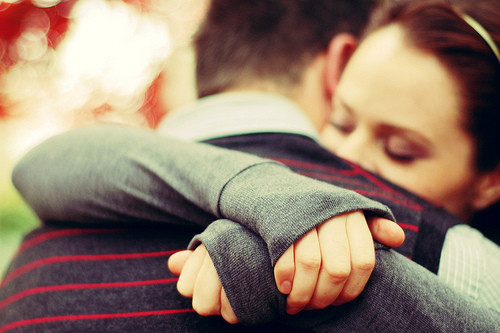
Relationships aren’t always easy. Like anything else in life, they have peaks and valleys. They have times where everything is going well, and couples are happy. At other times though conflict and problems arise, challenging and potentially threatening the relationship.
This is because we are first and foremost individuals. With our own needs, wants, and expectations for our life. And in a relationship we are trying to build a life with another individual who’s needs and wants will never perfectly match our own.
I recently read an article on dating that talked about this ideas that relationships start as looking for fulfillment of our own needs:
If you’re thinking that I’m telling you to use someone for your own benefit, you’re right: It is. But if you think dating is anything more than that, you’re confused. We date people to satisfy OUR wants and OUR needs. Once we find the right person, things get less selfish and egocentric.
This really sums up the dilemma people face with relationships. We start them because of what they do for us. We like how the person makes US feel, how well they meet OUR needs, and OUR wants.
When we are first getting to know them, we may think they are nice, or kind. But honestly, we don’t give a crap about them.
It’s all about us, and what they do for us.
But this sort of approach to a relationship is not sustainable in the long term. For a relationship to be successful, we need to become more than just two individuals spending time together. Instead of seeing the relationship as a vehicle for our own gratification, we have to start to see ourselves as part of a “we”.
And finding this balance between “me” and “we” is at the heart of all relationship problems.
This is less of an issue when you are dating, because dating is a facade. In dating, although we are *hopefully* being honest and being ourselves a part of us is also trying to be what we think they want in order to impress them.
In a long term setting this perfectly built facade breaks down, and the unedited version of the person comes out. Sometimes that person is VERY different from the one that was initially presented (in which case it’s probably a good time to get out – fast). Other times it’s largely the same person, but with a few more rough edges.
And when these rough edges start to show, it becomes apparent that this other person isn’t actually perfect (gasp!!!). They actually do have flaws, and to maintain a relationship with them our needs won’t always be met.
A Part of Something Bigger
When the flaws and problems start to surface, in order to sustainable the relationship, the focus on “me” has to change. You have to be willing to let your own ego take a back seat, and the only way to do that is if you see yourself as part of something bigger – a part of a couple, or a team.
If you look at the world of sports, there are many, many cautionary tales of people who has all the talent in the world. They were amazing athletes, and skilled from an “individual” standpoint. But their focus was them, and how the team was helping or hindering their career. This sort of focus is not conducive to a healthy team, and usually athletes who bring in this focus are eventually cut loose. To truly be successful, then need to embrace the concept of “team”.

That may be sports, but the same rules apply in any team setting; including relationships.
What allows people to do this is sometimes referred to as Emotional Intelligence.
There are all sorts of definitions for emotional intelligence, and a high level of emotional intelligence is often correlated with high levels of success – both personally and in a career setting.
Wikipedia defines emotional intelligence as:
the ability to recognize one’s own and other people’s emotions, to discriminate between different feelings and label them appropriately, and to use emotional information to guide thinking and behavior.
One of the ways of identifying emotional intelligence is through self-awareness, self-regulation and empathy.
- Self-awareness is being aware of your own emotional state, and knowing your strengths and weaknesses.
- Self-regulation is about being able to control your emotions, and not allowing emotions to control your decisions and actions (in an impulsive fashion).
- Finally, empathy is being able to understand other people’s emotions, and taking them into account when making decisions.
What is a Relationship
Dating is about having fun. It’s about having your needs met. And when they aren’t, you move on.
Relationships on the other hand are a bit more complicated. They are about building a partnership, and sharing your life with someone else. They involve both good times and bad, so they require both commitment and a willingness to work through conflict.
In a relationship, a high level of emotional Intelligence is perhaps the most important characteristic you can have. You NEED to be able to take the needs and wants of your partner into account in almost everything you do.
Does this mean you “give up you”? Does it mean your needs don’t matter? No, not at all.
You still matter. It’s not about giving up on your needs. But you aren’t the only thing that matters. Your partner also needs to matter to you. And when these needs conflict (which WILL happen at times) you need to be able to reach a common ground. That common ground may not be ideal for you, but sometimes the “we” needs to be bigger than the “me”.

Relationship Breakdown
When relationships start to break down, a common complaint is that one or both parties start “acting like they are single”. This doesn’t mean they are going out messing around with other people (though it could). Usually what it means is that empathy has broken down.
Empathy in a relationship is about taking your partner into account, and understanding that your actions impact them. Understanding that even if something isn’t important to you, it still needs to be a priority if it’s important to your partner.
The offending partner often stops taking the other person into account. Or maybe they still do, but only when that persons needs happen to line up with their own (in which case it doesn’t really count, does it?).

As it says above, focusing on yourself and doing what is best for you isn’t exactly the best recipe for a successful relationship.
A truly successful (and happy) relationship requires a reasonable degree of emotional intelligence by both parties. It requires empathy – considering your partner and taking them into account at all times.
In times of stress the world tends to turn inwards, and emotional intelligence breaks down. Thankfully, like anything else it is a skill that can be worked on and developed.
If your relationship is going through a hard time, always try to keep you partner in mind. Emotional intelligence, and empathy, is the key to long term success.











